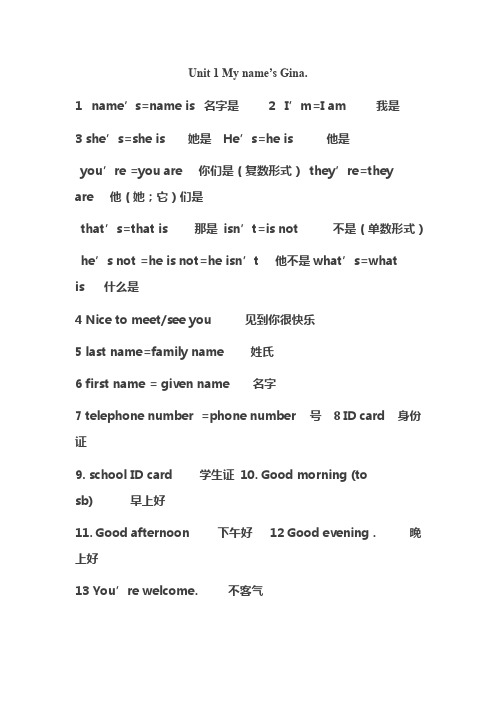新目标七上英语Unit 5 SB Reading
- 格式:ppt
- 大小:2.13 MB
- 文档页数:36

Unit 1 My name’s Gina.1 name’s=name is名字是2 I’m=I am我是3 she’s=she is她是He’s=he is他是you’re =you are你们是(复数形式)they’re=theyare 他(她;它)们是that’s=that is那是isn’t=is not不是(单数形式)he’s not =he is not=he isn’t他不是what’s=whatis 什么是4 Nice to meet/see you 见到你很快乐5 last name=family name 姓氏6 first name = given name 名字7 telephone number =phone number 号8 ID card 身份证9. school ID card 学生证10. Good morning (tosb) 早上好11. Good afternoon 下午好12 Good evening . 晚上好13 You’re welcome.不客气Unit 2 This is my sister1 aren’t=are not不是(复数形式)2 Thanks for your help 为了感激你的帮忙3. in the picture /in the first picture /in the nextpicture 在图中/在第一张照片中/ 在下一张照片中4. my family photo = a photo of my family 我的家庭照片5. family tree 家谱6.what about=how about 关于…怎么样7. a photo(picture) of …的一张照片8. the name of …的名字9. Have a good day! 过得愉快Unit 3 Is this your pencil?1 Thank you. =Thanks .谢谢你 2. in English 用英语3. computer game(s) 电子游戏4. Lost andFound 失物招领 5. in the lost and found box 在失物招领箱里6 a set of 一副;一套 a set of keys 一串钥匙7 who’s=who is谁是8. it’s=it is它是9. call sb at+号码/ E-mail sb. at +邮箱地址打给某人/ 给某人电子邮件10. school ID card 校卡11. in the classroom/ in the school library 在教室里/ 在图书管里12.ask the teacher for your computer game 找教师要你的电脑游戏Unit 4 Where’s my schoolbag?1 in the bookcase 在书橱里2 don’t=don not不是(动词主语形式)3 in your parents’ room在你父母的房间里4 Goodbye.= Bye-bye 再会5 under the chair 在椅子下面6 on the floor 在地上7. on your head 在你的头上8.on the wall 在墙上9. video tape / tape player/ radio/ model plane 录像带/ 录音机/ 收音机/飞机模型10 under the bed 在床下11 on the chair 在椅子上12 on the table 在桌子上Unit 5 Do you have a soccer ball?1.Do you have......? 你有...吗?Yes, I do. 是的,我有。


初一英语Unit 5 I’m watching TV人教新目标版【本讲教育信息】一. 教学内容:Unit 5 I’m watching TV[教学内容]一. 教学目标:(Aims)1. Talk about what people are doing. (谈论人们正在干什么.)2. Everyday activities. (日常活动)二. 语言结构(Language Structure)1. 现在进行时,(Present progressive tense)。
2. Yes/No的问句及其简短回答。
三. 目标语言:(Target Language)1. What are you doing? I’m watch ing TV.2. What’s he doing? He’s doing homework.3. Do you want to go swimming? Yes, I do.4. When do you want to go? At three o’clock.四.语法重点(Grammar Focus)I.现在进行时的一般用法1. 表示此时此刻(说话时)正在进行的动作。
例如:The teacher is talking with this student.这位老师正在同他的学生交谈。
What are you doing now?你现在干什么呢?2. 表示现阶段正在进行的动作。
例如:We are doing an experiment this week.我们本星期在做一个实验。
3. 现在进行时有时可用来表示将来发生的动作。
这一用法常用于go, e, leave, start等动词(大部分是短暂性动词),后面也常用表示较近的将来时间状语(如tomorrow, tonight, this morning/ Friday等),表示安排或计划好的事情。
例如:We are leaving for Shanghai tomorrow.我们明天启程去某某。

Unit 5 Do you have a soccer ball SectionA1a---2c (1课时)班级:姓名:学号:【学习目标】一、Vocabularies:1. Words: have, ball, tennis, volleyball, basketball, ping-pong, bat, do/does,2. Phrases: soccer ball, tennis ball, ping-pong bat, ping-pong ball, baseball bat,二、Main sentences:1.--Do you /they have a TV? -- Yes, I / they do. /No, I / they don't.2.--Does he /she have a soccer ball? --Yes, he/she does. No, he/she d oesn’t.三、学习动词have的一般现在时的用法;使用do和does引导的一般疑问句的构成以及简单回答。
【课前预习】一、预习活动1a, 翻译下列词组(每空一词):1.英式足球2.网球3.乒乓球拍4.棒球拍5.乒乓球6.有一个排球二、预习1c和2c,完成下列句子。
1. -- you have a (乒乓球拍)? --Yes, I .2. -- you (有)a ping-pong ball? --No, I .3. -- Jane have a (网球)?--Yes, .4. -- he have a (排球)?--No, .三、预习之后的疑问是【学习过程】一、幻灯片展示引出本节课的新单词,并教读这些单词。
二、Match the words with the things in the picture. Then check the answers. (Activity 1a)三、Listening tasks and pair work:1. Listen and circle the words you hear. Write down the sentences you have heard.2. Listen to the conversations and number the pictures. (2a)3. Listen and match the pictures in 2a with the balls. (2b)4. pair work:看2b中的物品,利用下面的句型进行对话比赛。


精品基础教育教学资料,请参考使用,祝你取得好成绩!Unit 5 Do you have a soccer ball?一、单元教学内容分析本单元的核心语言项目是ask and answer questions about ownership, 以及make suggestions。
主要话题是spending time with friends,学习邀请朋友运动以及谈论自己对某项运动的感觉等。
从Section A的sports things, 从have 的句型运用到语篇中的综合运用,循序渐进,逐步扩展。
二、教学目标1、能力目标(1)对所属关系进行问答,如:Do you have a soccer ball?(2)提出建议,发出邀请。
如:Let's play soccer.(3)谈论自己的感受。
如:That sounds good.2、知识目标(1)have 的一般现在时用法(2)一些球类用品名称(3)表达感受的几个形容词(4)提出建议的句型:Let's… .3、情感态度目标(1)由于该单元话题贴近学生生活,符合他们热爱运动的心理,可以提高他们学习英语的兴趣,积极参与英语实践活动。
(2)谈论与朋友共度时光,培养同学间团结,友爱的精神。
(3)谈论自己的感受,同时使学生在英语交流中注意并理解他们的情感。
三、教学重点难点1、教学重点Drill: Do you/they have…?Does he/she have…?I don't have…?He/She doesn't have… .Let's… .That sounds… .2、教学难点have 在一般现在时中的肯定,否定,一般疑问等形式。
尤其当主语为第三人称单数时。
四、课时安排1、Section A 1a. 1b. 1c. 2a. 2b2、Section A 2c. 3a. 3b. 43、Section B 1a. 1b. 2a. 2b. 2c4、Section B 3a. 3b. 3c. 4Period One Section A 1a-2b一、教学目标1、单词:soccer ball ,tennis racket ,ping-pong ball ,volleyball ,TV2、句型:Do you have a… ?Yes, I do./No, I don't.二、教学重点:掌握关于运动物品的名词三、教学难点:学会使用句型Do you have a… ? Yes, I do./No, I don't.四、教学设计Step1 Warming up:使用所学句型进行快速问答,激发学生快速反应和应变能力。
七年级英语上册Unit5 SB课文讲解1.I often act out stories with my brother at home. 我经常和我弟弟在家表演这些故事。
【用法详解】 with用法小结with为介词,意思比较多,常见意思如下:(1)“和…一起”Eg: I go to school with Lily. 我和莉莉一起去学校。
(2)“长着;戴着”Eg: The girl with big eyes is Lily. 那个长着大眼睛的女孩是丽丽。
(3)“拿着”Eg: Our teacher goes into the classroom with a book. 我们老师拿着一本书走进教室。
(4)“用”Eg: She wrote the letter with a pencil. 她用铅笔写字。
(5)“带有”Eg: I like drinking coffee with milk. 我喜欢和加奶的咖啡。
【即学即用】( B )1.She often goes to school _____ Mary.A.andB.withC.soD.as well as( D )2.I want some noodles _____ beef.A.andB.as well asC.alsoD.with2.I’m interested in nature.我对自然感兴趣。
【用法详解】Interested为形容词,译为“感兴趣的”,常常用来修饰人;Interesting为形容词,译为“有趣的”,常常用来修饰物,在句中可作定语和表语。
其名词形式为interest (名词) “兴趣”常见搭配:take an interest in doing sth.= be interested in doing sth. 对做某事有兴趣Eg: She is interested in reading books.= She takes an interest in reading books. 她对读书感兴趣。
初一英语第5单元上册初一英语第5单元上册的文章内容主要涉及以下几个方面:1. 介绍自己和家人:学生可以用简单的句子介绍自己的姓名、年龄、家庭成员以及他们的职业和爱好。
例如,"My name is Tom.I am 13 years old. I have a younger sister and my parents are both teachers. My father likes playing basketball andmy mother enjoys cooking."2. 描述外貌和个性特征:学生可以用英语表达人物的外貌和个性特征。
例如,"My sister has long black hair and big brown eyes. She is tall and slim. She is also very kind and helpful."3. 询问和给予信息:学生可以学习如何用英语询问和给予基本的个人信息,例如年龄、电话号码和地址。
例如,"How old are you?" "What's your phone number?" "Where do you live?"4. 描述日常生活:学生可以用英语描述自己的日常活动和习惯。
例如,"I usually get up at 7 o'clock in the morning. After brushing my teeth and washing my face, I have breakfastwith my family. Then I go to school by bus. In the afternoon, I have different classes like math, English, and PE. After school, I like playing soccer with my friends."5. 谈论学校和课程:学生可以用英语谈论他们的学校和不同的学科。
人教新目标英语七年级上册Unit 5 Do you have a soccer ball?一、重点短语play soccer踢足球play tennis打网球play ping-pong打乒乓球play volleyball打排球play basketball打篮球play baseball打棒球play computer games打电子游戏play games做游戏play cards打牌let’s=let us让我们一起play sports=have sports做运动tennis racket网球拍ping-pong bat乒乓球拍baseball bat 棒球棒sports club运动俱乐部be late for sth迟到做...get to sp到达某地watch TV看电视have an English class上英语课be in Class One在一班(读书)every day每天(常用在句末)have a great sports collection收藏了大量的体育用品on TV在电视上(通过电视播放)on the TV在电视机上(表方位)二、重点句子1. I have a basketball. 我有一个篮球。
2. He has a baseball. 他有一个棒球。
(肯定句)3. I don`t have a tennis ball. 我没有一个网球。
(否定句)4. He doesn't have a ping-pong ball. 他没有一个乒乓球。
5. Do you have a soccer ball? Yes,I do./No,I don`t.Does he have a volleyball? Yes,he does./No,he doesn’t.6. Let`s play computer games. 我们去打电子游戏吧!(祈使句,动词用原形)7. That sounds good/interesting(fun)/boring/relaxing/difficult.He only watches them on TV. (only修饰动词,常用在动词之前)He has only five basketballs. (only修饰数词,常用在数词之前)8.She plays sports every day. 她每天做运动。
七年级上册英语unit5
以下是七年级上册英语Unit5的相关信息:
单元主题:这个单元的主题是“学校生活”,主要围绕学生在学校的生活进行展开。
主要内容:
1. 词汇和表达:这个单元会学习一些与学校生活相关的词汇,如“图书馆”、“食堂”、“教室”等,以及一些表达方式,如“我通常在图书馆学习”、“放学后我喜欢打篮球”等。
2. 语法:这个单元会学习一些基本的英语语法,如现在进行时、一般现在时等。
3. 听力和口语:这个单元会通过听力材料和口语练习来提高学生的听力和口语能力,让学生能够听懂简单的英语对话,并且能够用英语进行简单的交流。
4. 阅读和写作:这个单元会通过阅读和写作练习来提高学生的阅读和写作能力,让学生能够读懂简单的英文短文,并且能够写一些简单的英文句子。
学习目标:
1. 让学生能够掌握与学校生活相关的词汇和表达方式。
2. 让学生能够掌握一些基本的英语语法。
3. 提高学生的听力和口语能力,让学生能够用英语进行简单的交流。
4. 提高学生的阅读和写作能力,让学生能够读懂简单的英文短文,并且能够写一些简单的英文句子。